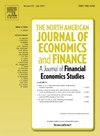Explosiveness in the renewable energy equity sector: International evidence
IF 3.8
3区 经济学
Q1 BUSINESS, FINANCE
North American Journal of Economics and Finance
Pub Date : 2025-01-01
DOI:10.1016/j.najef.2025.102378
引用次数: 0
Abstract
This paper investigates episodes of explosiveness in the renewable energy equity sectors of the three major economic regions, namely the U.S., China, and Europe, as well as the degree of connectedness between these regional renewable energy sectors and their respective broader stock markets. To this end, the novel methodology developed by Phillips and Shi (2019) is employed in conjunction with the robust bootstrap procedure of Phillips and Shi (2020). Furthermore, the connectedness framework of Diebold and Yilmaz, 2012, Diebold and Yilmaz, 2014 is used to assess return connectedness. The empirical results reveal significant episodes of explosiveness within the renewable energy sectors across the three regions. The principal period of explosivity began in late 2020 within U.S. and European renewable energy stocks, following the initial COVID-19 pandemic wave, and subsequently spread to Chinese renewable energy stocks. However, there is limited co-explosivity between the renewable energy sectors and broader stock markets, indicating that the explosive dynamics in renewable energy equities do not pose a systemic threat for the general stock markets. Additionally, the study reveals a decrease in connectedness between the regional renewable energy sectors and their broader market counterparts during the recent explosive periods, likely reflecting the decoupling of renewable energy stocks from general market trends during the latter stages of the renewable energy bubble.
可再生能源股票领域的爆炸性:国际证据
本文研究了美国、中国和欧洲这三个主要经济区域可再生能源股票行业的爆炸性事件,以及这些区域可再生能源行业与各自更广泛的股票市场之间的联系程度。为此,将Phillips和Shi(2019)开发的新方法与Phillips和Shi(2020)的鲁棒自举程序结合使用。此外,我们使用Diebold and Yilmaz(2012)和Diebold and Yilmaz(2014)的连通性框架来评估回报连通性。实证结果显示,这三个地区的可再生能源行业具有显著的爆炸性。美国和欧洲可再生能源股的主要爆炸性时期始于2020年底,紧随最初的COVID-19大流行浪潮之后,随后蔓延到中国可再生能源股。然而,可再生能源行业和更广泛的股票市场之间存在有限的共同爆炸性,这表明可再生能源股票的爆炸性动态不会对整体股票市场构成系统性威胁。此外,该研究显示,在最近的爆炸性时期,区域可再生能源行业与更广泛的市场同行之间的连通性有所下降,这可能反映了可再生能源泡沫后期可再生能源股票与总体市场趋势的脱钩。
本文章由计算机程序翻译,如有差异,请以英文原文为准。
求助全文
约1分钟内获得全文
求助全文
来源期刊
CiteScore
7.30
自引率
8.30%
发文量
168
期刊介绍:
The focus of the North-American Journal of Economics and Finance is on the economics of integration of goods, services, financial markets, at both regional and global levels with the role of economic policy in that process playing an important role. Both theoretical and empirical papers are welcome. Empirical and policy-related papers that rely on data and the experiences of countries outside North America are also welcome. Papers should offer concrete lessons about the ongoing process of globalization, or policy implications about how governments, domestic or international institutions, can improve the coordination of their activities. Empirical analysis should be capable of replication. Authors of accepted papers will be encouraged to supply data and computer programs.

 求助内容:
求助内容: 应助结果提醒方式:
应助结果提醒方式:


